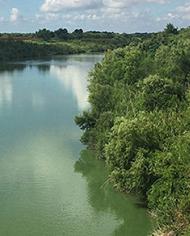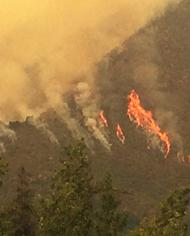Healthy rangelands are essential for ensuring grazing and forage productivity, reducing wind erosion and wildfire risks, and supporting wildlife ecosystems.
Tellus Articles
ARS researchers are mapping the genome of the passionflower bee in order to help protect bee diversity.
ARS scientists develop monitoring system to support farmers in their effort to protect the Chesapeake Bay
Aquaponic systems may help sweetpotato industry and feed ‘urban deserts.’
ARS researchers in Boise, ID, are studying prescribed fires in western juniper type landscapes to better understand how this land management tool affects the hydrology, habitat, and overall ecosystem of this land type.
Researchers bring rosette weevil to bear on yellow star thistle.
Scientists develop new sorghum lines to help cash crops from nematode attacks.
ARS Researchers search for solutions to X-disease, devastating the U.S. sweet cherry industry.
ARS researchers aim to curb the spread of invasive pests and plants through Area-Wide Pest Management
ARS researchers have made a new discovery that could benefit the U.S. catfish industry.
ARS researchers study the effectiveness of nematodes in reducing a major soybean foe.
A tiny wasp is turning out to be an important ally for one of America’s biggest crops.
ARS researchers are studying the potential benefits of reversing soil erosion on hilly lands
Scientists discovered that bees and hoverflies collect pollen from centipedegrass flower heads.
Disease-carrying pests cost the world billions.
Understanding what can affect genes may lead to more potent vaccines
Disposable Consumer Products May Sprout Antimicrobial Resistance
More greenhouse gas comes from water than land.
Scientists are investigating how farmer can maximize profitability with limited water.
Scientists work to define how agriculture affects greenhouse gasses and more
ARS project begins to refill water source beneath Mississippi Delta.
A new approach to tackling the spotted-wing drosophila involves manipulating the behavior of these insects.
Researchers use long-term data to assess organic practices.
Electricity makes fire ants release pheromone that attracts natural predators.
ARS scientists are studying declining populations of the lady beetle.
Study shows that the old rule of thumb may not apply to all situations.
Growing switchgrass in non-irrigated pivot corners may help make farmers’ ends meet
ARS works with foreign scientists to prevent overseas diseases from spreading to the United States.
Researchers search for solutions to a deadly livestock virus that hides in plain sight.
Researchers train the next generation for the science of upheaval.
Like ‘mad cow,’ chronic wasting disease in deer currently has no cure.
See how ARS researchers are using insects to reduce the presence of Arundo, a fast-growing invasive grass.
A site in the middle of Missouri provides critical agricultural research on the national scale.
ARS researchers are downscaling climate data to improve modeling techniques.
ARS researchers are working on improving fish fillet quality.
ARS researchers look to improve diagnosis, testing, and vaccines for leptospirosis.
A new workshop unites practice with research on the beneficial effects of fire.
The black soldier fly can reduce waste, serve as feed, and reduce emissions.
New uses for leftover agricultural products promise more revenue and less waste.
Before you know it, you might be fueling your car from a tree or bale of hay.
Advanced research and technology could squeeze every drop from feedstocks.
Research and commerce use a two-pronged ‘fork’ approach to deal with invasive fish
The infamous spike protein doesn’t just help spread viruses – it can also be weaponized to stop them.
Small herbivores consider restoration seedlings a delicacy.
Scientists repurpose natural chemicals to kill disease-carrying insects.
New techniques use radiation to eliminate dangerous mosquitoes.
No cure yet, but treatment options for devastating ailment may be on the way.




















































